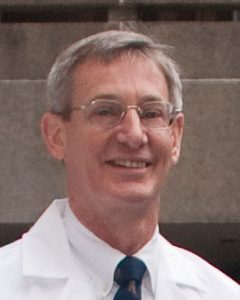Living with diabetes takes a commitment to managing it with healthy lifestyle choices. But even before you can do that, you have to be aware you have diabetes.
According to the International Diabetes Foundation, for every adult diagnosed with diabetes, there’s an undiagnosed diabetic. That’s an estimated 230 million adults worldwide who aren’t taking control of their disease because they’re unaware they have it.
‘Obviously I wouldn’t be doing this if I didn’t feel I was getting the best treatment there is. And I feel that way.’
Jim Grant was 28 when he got out of the Navy. Given his family history – his grandfather was diabetic – he went for a fasting test to check his blood sugar. It came back fine. For some reason, it took another 10 years for his diabetes to show itself.
“The symptoms that came on were the loss of weight, thirst, and then of course when they checked my blood sugar it was like 600 or something,” Grant says. “I saw my primary care physician and finally got referred to UConn and Dr. Malchoff after a few years of struggling a little bit with trying to get the direction I needed.”

Dr. Carl Malchoff is an endocrinologist who joined the UConn Health faculty in 1985. He is the medical director of UConn Health’s diabetes program.
It turns out Grant has type 1 diabetes, in which the pancreas produces little or no insulin. Type 1 diabetes historically was also referred to as juvenile diabetes, as it usually would first appear during adolescence. For him the education would come quickly.
“Insulin-dependent diabetics have to manage their disease with insulin, diet and activity/exercise. Added variables include stress, illness, availability of food especially when traveling, and the impact of the weather on the body. All these variables impact your blood sugar and can create a challenge to maintain your health and avoid low blood sugar which can be a medical emergency,” says Grant, whose regimen started with insulin shots in the early years and progressed to an insulin pump about 10 years ago.
When he started seeing Malchoff, Grant lived in Simsbury. About five years later he moved to Canton. Then in 2005, he moved again – to Rindge, New Hampshire. Still, to this day, he returns to Connecticut to see Malchoff, making the drive of more than 100 miles each way four times a year.
“It basically is a day to go down and go back,” Grant says. “Obviously I wouldn’t be doing this if I didn’t feel I was getting the best treatment there is. And I feel that way.”
Grant recalls his wife asking him several years ago why he drives more than two hours each way to UConn Health instead of finding a local endocrinologist.
“So I said to her, ‘Why don’t you go with me this next trip, and you can meet Dr. Malchoff?’ And she came in with me for the visit,” Grant says. “And then we were done and were walking to the car, she said, ‘Now I know why you come down here.’”
Grant took full ownership of diabetes education for his own health, then took it to a new level to benefit others. It wasn’t long into his patient relationship with Malchoff that he became the patient representative on UConn Health’s diabetes education program advisory group, which normally meets twice a year. When the meetings were held in person, Grant would time his appointments with Malchoff around them.
“Jim brings with him a unique important and frank perspective on disease management,” Malchoff says. “As a physician who relies on hard science to assist in decision making, it is easy for me to forget that there are real people with real world problems that need to be addressed in order to apply the best care. Jim, in his frank but extremely polite manner, presents these issues to our group. We are indebted to him for his commitment of time and effort to the diabetes cause and especially to our diabetes education program.”

Jean Kostak, one of UConn Health’s certified diabetes care education specialists, facilitates the group as the quality/program coordinator for diabetes education. She says Grant provides the valuable perspective of someone who is challenged daily to make the best choices to optimize his health.
“This input assists us with providing diabetes education that is relevant to the patient’s individual challenges,” Kostak says. “Jim consistently gives us insight into his challenges with insulin pumping, continuous glucose monitoring, insurance barriers and overall diabetes management so that we can structure our education program goals to meet the needs of all our patients.”
Grant says his experience gives him an appreciation and respect for those who are going through similar challenges with their diabetes.
“I appreciate the opportunity to be able to provide input from my perspective, not only to the people on the committee, but for them to be able to, if they can, translate it back to some of their patients,” Grant says. “This is a difficult disease to manage and manage well.”
Between his passion for the advisory group and his satisfaction with his care at UConn Health, Grant says the commute is not a hardship.
“The reason I continue with Dr. Malchoff is because I think he knows me better than I know myself,” Grant says. “He’s careful to give direction based on my total person. In other words he doesn’t just take into consideration my test results and say, ‘You got to do this.’ He looks at my lifestyle, how I exercise, how I eat, where I live, all those kinds of things. And he’s careful to integrate that into a plan we put together. He listens. I mean, the man is a wonderful listener. Our relationship is based on mutual personal respect, and that is a key ingredient that you don’t always find.”
The International Diabetes Federation and the World Health Organization designate Nov. 14 as World Diabetes Day, on the birthday of Sir Frederick Banting, one of the discoverers of insulin. The theme this year is “The Nurse and Diabetes,” intended to raise awareness around the important role nurses play in supporting those living with diabetes.
The nurses in UConn Health’s diabetes program include:
- Amy Clark, diabetes nurse care and education specialist
- Bonnie Ferguson, endocrinology nurse
- Luriza Glynn, nurse practitioner and certified diabetes educator
- Heather Myrick, endocrinology nurse practitioner
- Rebecca Santiago, diabetes nurse care and education specialist
Additionally, the American Diabetes Association marks November as American Diabetes Month. The theme this year is “We Stand Greater Than Diabetes.”
Learn more about diabetes care at UConn Health, or call 860-679-2626 for a consultation.



